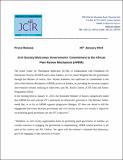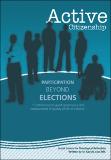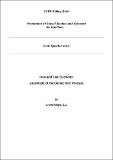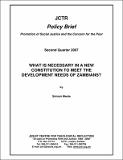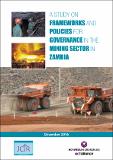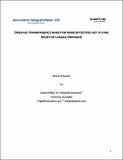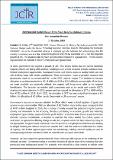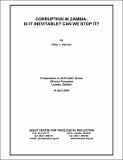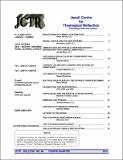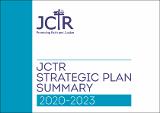Governance: Recent submissions
Now showing items 41-55 of 55
-
Civil Society Welcomes Governments’ Commitment to The African Peer Review Mechanism (APRM)
(2013-01-25)The government has reaffirmed its commitment to the African Peer Review Mechanism (APRM) process in Zambia, by providing the necessary support and resources towards realizing its objectives. The government does not intend ... -
Active Citizenship Participation Beyond Elections
(2016)Zambia witnessed historic elections on 20 September 2011 in which the Patriotic Front (PF) emerged winners ousting the former ruling party the Movement for Multi Party Democracy MMD. The September elections, ended 20 years ... -
Free and Fair Elections: Essentials of the Democratic Process
(2011-04)This year, 2011, Zambia will be holding its fourth general elections and fifth presidential election since the country’s return to multi-party democracy in 1991. Although there have been contrasting assessments with regard ... -
Zambia’s Trade Situation: Implications For Debt And Poverty Reduction
(2005)The problem of unsustainable external debts continues to be a major source of concern among the civil society, cooperating partners, government and indeed other stakeholders. With Zambia’s qualification to the Heavily ... -
Economic, Social and Cultural Rights (ESCR): Foundations for Daily Living
(2019)In 1948, the United Nations General Assembly adopted the Universal Declaration of Human Rights (UDHR), outlining the basic civil, cultural, economic, political and social rights that all human beings should enjoy. In 1966, ... -
What is Necessary in A New Constitution to Meet the Development Needs of Zambians?
(2007)There is so much discussion in Zambia about the Constitution, especially with regard to what should be in the new Constitution as the National Constitutional Conference (NCC) meets. The Mung’omba Draft Constitution which ... -
What is The Church’s Social Teaching Saying About Gender Equality?
(2008)Each one of us is born and raised up in a family. Some of us have been raised up by both parents, some by a single parent, some by relatives, and some by guardians, while others have grown up in streets with fellow children. ... -
Taking Hold of Our Future Through The African Peer Review Mechanism
(2009-03)The obvious purpose of this Working Paper is to assist all stakeholders (e.g., government, civil society, and private sector) in Zambia to own an informed and effective place in the APRM process that will mean an improved ... -
Zambia’s Economic, Social and Cultural Rights: Why Should They Be in the New Constitution?
(2004-12)Why are there so many people around us today in Zambia who are jobless, homeless, hungry, illiterate, failing to access proper medical care, and without safe water and sanitation? Is this the result of some authority’s ... -
A Study on Frameworks And Policies For Governance in The Mining Sector in Zambia
(2016-12)Most of Zambia’s large-scale copper mines are located on the Copperbelt Province and North- Western Province. Zambia like all states has an obligation to respect human rights and fundamental freedoms as enshrined in the ... -
Does Aid Transparency Make For More Effective Aid? A Case Study of Lusaka Province
(2011-09)The main general hypothesis regarding aid is that it plays a critical role in fostering economic growth and development in the recipient countries. However, several empirical studies do not corroborate this hypothesis. It ... -
2020 National Budget Doesn’T Offer Much Relief To Ordinary Citizens
(2019-10-01)On Friday, 27th September 2019, Finance Minister, Dr. Bwalya Ng’andu presented the 2020 National Budget under the theme “Focusing National Priorities towards Stimulating the Domestic Economy”. As in the Presidential address, ... -
Corruption in Zambia: Is it Inevitable? Can We Stop it?
(2007-04-19)So what new can possibly be said about this topic of corruption in Zambia? Haven’t we already heard more than enough about the topic? And really, what difference does yet another paper make on the presence of corruption ... -
JCTR Bulletin 4th Quarter 2010
(2010)The fourth quarter in Zambia, since 2009, is occupied with discussions of the National Budget and how Government is going to implement its programmes in the coming year. It is worth noting that before then Budget discussions ... -
JCTR Strategic Plan Summary (2020 - 2023)
(2019)Jesuit Centre for Theological Reflection is a faith based organisation and a Ministry of the Society of Jesus (Jesuits) operating in Zambia since 1988 to promote social justice. Our work is underpinned by the Church Social ...

